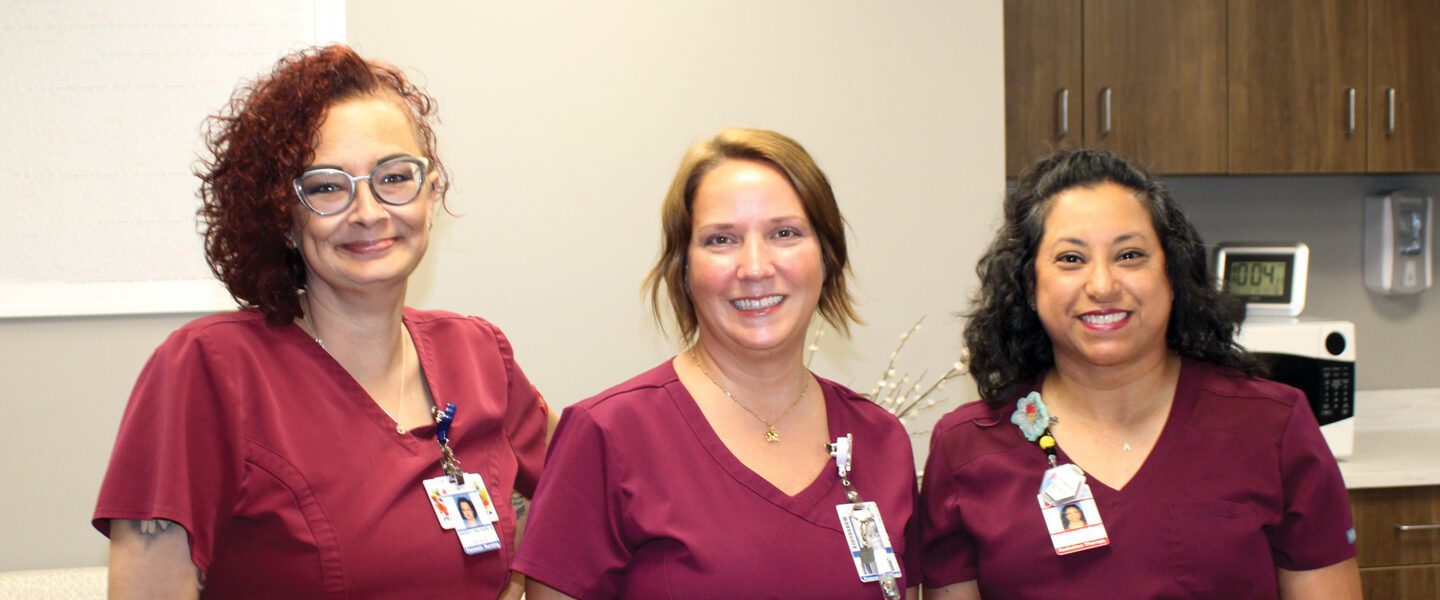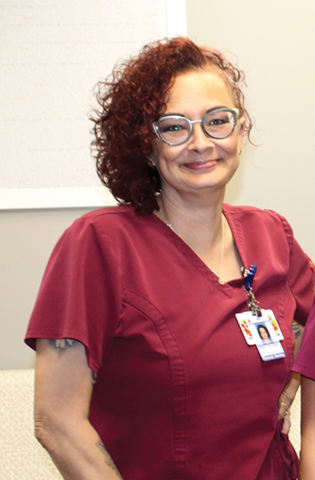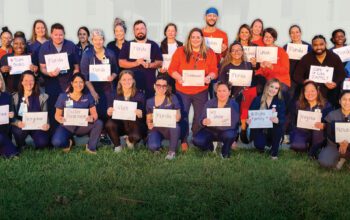Forensic nurses raise awareness about available services, and they work closely with law enforcement and state and social agencies to care for the most vulnerable patients.


Jacqueline “Jackie” Maillet, RN, SANE-A, SANE-P, and her staff rarely can anticipate what awaits them each day at Mission Health Hospital in Asheville, North Carolina.
Jackie serves as a certified Sexual Assault Nurse Examiner (SANE) for both adults and pediatrics, and is also director and program coordinator for Mission’s Compassionate Care Unit. She and her forensic nursing team are dedicated to caring for the hospital’s most vulnerable patients — those suffering from trauma. Their wounds are not always visible, but the danger some face can be life-threatening, requiring collaboration among multiple agencies, including law enforcement.
Upholding our mission to care for and improve human life makes extending compassionate care to these vulnerable patients inherent to who we are. Our unwavering commitment to keeping our communities safe and healthy drives the work of these essential caregivers and the person-centered care they deliver.
Jackie’s team serves western North Carolina, a mostly rural region of Appalachia that has a population of less than 800,000 people across 16 counties. Patients may come to the unit directly, through Mission’s emergency department or via social agencies. Cases can include domestic violence or intimate partner violence (unmarried couples), human trafficking, elder abuse, child abuse and/or other forms of assault. Many of the patients are indigent, and patients never receive a bill — even for follow-up care — due to state-funded grants.
Jackie and her team cared for roughly 400 patients each of the past two years, but the number is currently trending much higher, with close to 400 patients already as of 2023.
“We’ll see anybody affected by violence in western North Carolina, because we’re it for the western part of the state,” says Jackie.
In the Midwest, Amy Mitchell, RN, forensic nurse coordinator for Wesley Hospital in Wichita, Kansas, oversees a staff of seven that provides 24-hour coverage for these cases, seven days a week. In 2022, Amy’s team cared for almost 800 patients, with a distinct increase during the COVID-19 pandemic.
“I feel like domestic violence went up significantly,” she says. “Every year, we have more patients. That’s a constant.”
Wesley Hospital is the hub for several satellite facilities, expanding the SANE unit’s reach into surrounding counties. Ensuring community access to this critical care means safety is one step closer for these patients. Amy regularly attends multidisciplinary team meetings that bring together community partners working to serve patients and their families. That team may include healthcare providers, Department for Children and Families caseworkers, law enforcement, advocates, the district attorney’s office, school personnel, and advocates for victims of domestic violence and sexual violence.
HCA Healthcare’s forensic nurses are making significant inroads in serving these patients, raising awareness about available services, providing a safe haven — or the road map to a safe haven — and working closely with law enforcement and state and social agencies to provide desperately needed care.
“We have a menu of services — the nurse pulls what’s applicable to the particular event, and the patient has the ultimate say,” says Jackie.
The nurses who work with us have all kinds of backgrounds, but everyone brings something to the table. They’re all amazing.— Jacqueline Maillet, RN, SANE-A, SANE-P, Mission Health Hospital, Asheville, North Carolina
A rare skill set
Forensic nursing is a complex job, blending comprehensive, compassionate care with a steely, discerning eye for gathering medical information, all without bias.
“The nurses who work with us have all kinds of backgrounds, but everyone brings something to the table,” Jackie says. “I have hospice nurses, who are great with talking to families. I have pediatric nurses; I have labor and delivery nurses; I have ER nurses. They’re all amazing.”
Given the nature of a role like forensic nursing, it’s not the right fit for everyone.
“This isn’t a job that a lot of people want, because … every patient is here for a traumatic reason, and to be able to handle that takes a certain kind of nurse,” says Amy.
“This nurse needs to be able to hold space for the patients so that they feel safe,” she adds. “They need to have empathy and compassion for all, without judgment. They need to be grounded in self-care to help deal with repeated trauma and also be able to leave work at work and not take it home.”
Caring for these patients like family takes on new meaning. Throughout an organization where a variety of community care, resources and programs are readily made available, HCA Healthcare’s dedication to delivering safer, more equitable care comes in to particularly sharp focus in these cases.
Forensic nurses must also adopt the long view, understanding that domestic violence often has deep roots. It can take months to break the cycle of abuse when there are rarely any quick fixes.
“For domestic violence patients, it may be someone we see over and over and over again,” says Jackie. “For a provider, you have to know that you plant a seed every time they come in and see you. It may take two years to leave [an abuser]. But after two years, if they leave and they’re safe, then we’ve done our job.”
Compassionate care for the patients goes hand in hand with compassionate care for the team.
“Honestly, the biggest challenge for me, personally, is making sure that my nurses are doing OK,” says Amy. “We’re all here to support each other and to support the patients. That makes a very, very difficult job doable.”
For domestic violence patients, it may be someone we see over and over and over again. For a provider, you have to know that you plant a seed every time they come in and see you. It may take two years to leave [an abuser]. But after two years, if they leave and they’re safe, then we’ve done our job.— Jacqueline Maillet, RN, SANE-A, SANE-P, Mission Health Hospital, Asheville, North Carolina
Training for trauma
Forensic nurse examiners undergo rigorous training. Jackie and Amy prefer applicants with at least one or two years of experience as a registered nurse.
Specialized forensic nursing training requires a 40-hour adult/adolescent SANE course and a 40-hour pediatric SANE course. That coursework is followed by a six- to 12-month preceptorship with an experienced forensic nurse before taking on their own patient load.
“You need excellent assessment skills,” says Jackie, who was first certified in 1998 in Massachusetts and came to Mission roughly three years ago. “New graduates need some time to experience all kinds of patients and ranges of injuries and illnesses to know how to use the toolbox and menu we come with.”
That’s especially true in domestic violence/intimate partner violence cases, she says, “because the patient may not be ready to leave [an abusive partner]. You need some finesse in teaching exit strategies and [ways to] keep themselves safe.”
The training, in reality, never ends. There are continuing education courses, with caregivers presenting talks on a broad range of topics. The International Association of Forensic Nurses offers training sessions to help nurses keep their skills sharp and ensure that they’re following best practices.
“Then we do a lot just within our own department with peer review,” Amy says. “I review every chart and case that comes through, but I have other nurses who do that too, so that we all can learn from each other.”
New graduates need some time to experience all kinds of patients and ranges of injuries and illnesses to know how to use the toolbox and menu we come with.— Jacqueline Maillet, RN, SANE-A, SANE-P, Mission Health Hospital, Asheville, North Carolina
Improvements in care
The SANE units in North Carolina and Kansas are housed near, but not adjacent to, emergency rooms. They’re intentionally not a part of the ER, even though that’s where many victims first enter the hospital.
Jackie explains that abuse victims typically need a quiet space where they can feel safe and unhurried. The one-on-one examinations and assessments can last from four to 12 hours and can be labor intensive. But they are necessary to ease tensions and build trust.
Amy notes that Wesley Hospital officials supported remodeling to create a beautiful space for her unit, incorporating suggestions for a warm, welcoming atmosphere with comfortable furniture and toys for children.
“When someone comes in and is talking about possibly the worst day in their life, you don’t want it to be so sterile,” she says.
HCA Healthcare also ensures that nurses have the best equipment available.
“They have never said ‘no’ to me. I can’t say that enough,” says Jackie. “They provided two $15,000 Cortexflo cameras, one for each site.”
The forensic-grade cameras — an invaluable tool — can detect bruises before they surface, ensuring that the nurses can collect the most accurate images possible.

Partnering with police and social agencies
Jackie and Amy emphasize that patient care is always the primary goal, but their job also requires them to work closely with law enforcement and social agencies.
“I am a nurse first, so the first thing I want to know is, ‘Are you OK?’ Then, what’s medically wrong? Can we fix the medically wrong things before we start talking about evidence collection?” says Jackie. “Then we have extra-special training in looking at injury and injury patterns and things that are most common with these types of violence.”
Still, the evidence collection aspect is critical. The law enforcement component highlights the difficult dual role of a forensic nurse. They must care for their patients with compassion and understanding while also maintaining a sense of neutrality when assessing each individual case and representing those cases in the legal system.
Forensic nurses will typically stay with their patients throughout the assessment process, not only to ensure continuation of care but also to avoid the mishandling of evidence. Although many abuse cases are settled before reaching trial, forensic nurses must be prepared to testify regarding the patients they’ve cared for.
Forensic nurses can also counsel and educate patients, steering them toward services such as safe housing options. Successful SANE programs establish solid working relationships outside the hospital with law enforcement, the courts and social service agencies. Jackie refers to the Buncombe County Family Justice Center as a “unicorn,” a clearinghouse for all law enforcement and social services her patients may need; there they can get everything from restraining orders to advice.
I am a nurse first, so the first thing I want to know is, ‘Are you OK?’ Then, what’s medically wrong? Can we fix the medically wrong things before we start talking about evidence collection?— Jacqueline Maillet, RN, SANE-A, SANE-P, Mission Health Hospital, Asheville, North Carolina
Improving awareness
Forensic nurses also educate others about their work, both inside the hospital with other nurses, physicians, technicians and executives, and outside, with partners, nursing schools and the general community.
“It’s a constant — educating the staff and ensuring that everybody’s on the same page with our types of patients,” says Amy. Her staffers also leverage their own social networks, such as church groups, to discuss their programs. “And we go to nursing schools, because those nurses are going to be on the front lines.”
Jackie and Amy work with school systems and participate in events like Take Back the Night to highlight their services. And Jackie reached out to a local television station, which broadcast several segments highlighting the work being done by Mission’s SANE unit. She also created a SANE section on Mission’s website. Because of those two actions, people are more likely to find her department via an online search. But that, she says, is just a start.
“I want to expand so that everybody has access to us,” says Jackie.
The more patients know, the better prepared they are to make better choices. Education, says Amy, is key to dispelling many myths surrounding reporting abuse and creating a foundation of hope. Jackie and Amy also want their patients to know that they’re not alone in their struggles.
“I don’t think the kids or the adults will ever know how many hands, hearts and prayers are invested in their lives,” says Amy. “Even when we go to the multidisciplinary team meetings, there are probably 20 or 30 people working for that patient and their family.”
The calling to become a nurse is a rare and beautiful thing. At HCA Healthcare, we are grateful for the caregivers throughout our facilities who are actively changing — and often saving — the lives of their patients.
For any victim of abuse, the National Domestic Violence Hotline is 1-800-799-7233.
More Ways of Protecting Colleagues and Communities
Medication Diversion Toolkit
HCA Healthcare’s Medication Diversion Toolkit initiative — known as “Speak up because you care” — offers educational and emotional well-being resources to promote a culture of safety for colleagues and to reduce the risk of medication diversion to patients, colleagues and communities.
‘Crush the Crisis’
HCA Healthcare’s annual “Crush the Crisis” prescription drug take-back day, an event that aligns with the Drug Enforcement Administration’s National Prescription Drug Take Back Day, included more than 100 facilities across 17 states last year.
Approximately 54,400 pounds of unused or expired medications have been collected since HCA Healthcare began the enterprise-wide initiative in 2019.
Stop the Bleed®
In recognition of May’s STOP THE BLEED® month, HCA Healthcare’s trauma and emergency services teams across the enterprise conducted life-saving training for more than 4,500 community members and non-clinical colleagues at many of our facilities and campuses. STOP THE BLEED® — an initiative of the American College of Surgeons, the Committee on Trauma and the Hartford Consensus — is a national awareness and education campaign focused on saving victims from bleeding to death, which is the number one preventable cause of death after an injury.


